With enterprise blockchain solutions, you can build and scale your Web3 projects effortlessly. By using Moralis – the market’s leading Web3 provider – you can benefit from the following:
- ✅ Industry-Leading Web3 APIs – Get transaction, NFT, and token data from EVM-compatible chains and non-EVM-compatible networks like Solana. Build world-class blockchain applications such as crypto wallets and portfolio trackers!
- ✅ Cross-Chain Compatibility – Moralis offers multiple network support for blockchains and L2s such as Ethereum, Polygon, Avalanche, Solana, Cronos, and others!
- ✅ Multiple Tech Stack Integrations – With tech stacks such as Firebase and Supabase, you can integrate your Web3 project effortlessly.
- ✅ Game Engine Support – Add Web3 features into PlayFab, Unity, and Google Cloud to create next-gen Web3 games.
- ✅ Stability and Reliability – Custom SLAs and a long track record running mission-critical blockchain infrastructure for the biggest dapps prove the stability and reliability of Moralis!
- ✅ Customer Obsession – 24/7 support in more than 40 countries, a developer forum, and a developer Discord community to help you get the most out of the enterprise blockchain solutions from Moralis.
TRUSTED BY INDUSTRY LEADERS
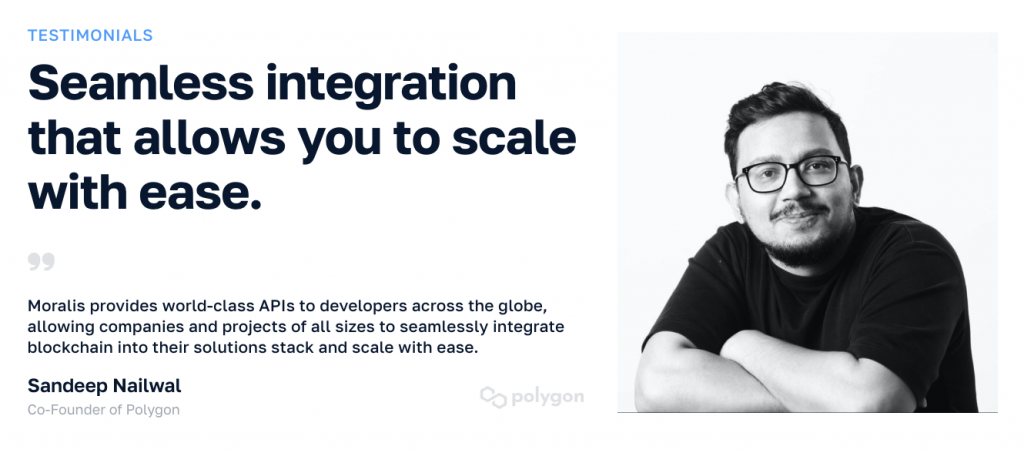
Additionally, Moralis enables you to cover Web3 features with short snippets of code. Here are some popular examples of using the JS SDK from Moralis:
- Balance API – Get the native balance of an address:
const response = await Moralis.EvmApi.balance.getNativeBalance({ address, chain, }); - Authentication API – Authenticate users:
const result = await Moralis.Auth.requestMessage(options);
- Moralis Streams API – Create a stream and listen for real-time on-chain events:
const newStream = await Moralis.Streams.add(options)
If you want to learn how to implement the above-presented code snippets, take on our beginner-friendly tutorials and demos that await you in the Moralis Web3 documentation and on our blockchain development YouTube channel. All you need is a free Moralis account!
However, if you want to learn more about enterprise blockchain solutions from Moralis, read on!
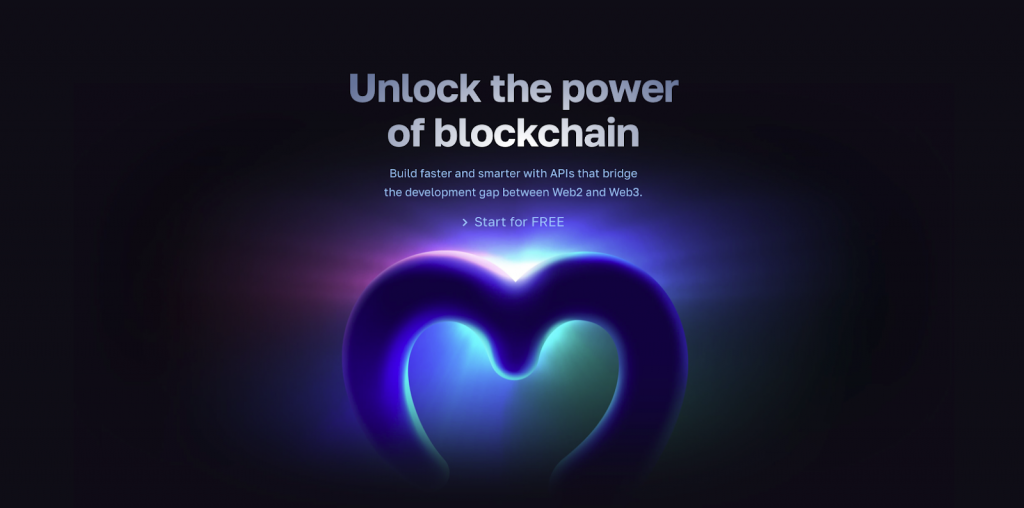
Overview
For most businesses, it makes no sense to waste precious resources on developing their own Web3 infrastructure. Fortunately, they can opt for enterprise blockchain solutions offered by reliable Web3 providers, such as Moralis. That way, Web3 for business becomes a reality!
Moving forward, we’ll first outline important blockchain solutions for enterprise models. Then, we’ll focus on the ultimate option – Moralis, where you’ll have an opportunity to learn the gist of all products and services from Moralis. In the second half of today’s guide, we’ll provide additional context surrounding the “enterprise blockchain solutions” topic. As such, you’ll be able to learn what blockchain solutions and services are and what the current blockchain tech stack looks like.
All in all, there are different paths and angles to explore when joining the Web3 revolution. To determine your optimal approach, you need to consider your company’s position and goals. You need to know if you want to use the power of blockchain internally (private blockchains) or externally (public blockchains). Then, consider your industry and how (if at all) the benefits of blockchain make sense for your enterprise. Complete hand-off solutions will work best for companies that do not wish to build on top of blockchain tech. However, companies looking to create their own solutions (e.g., Web3 wallets, portfolio trackers, etc.) should opt for scalable Web3 infrastructure tools and BUIDL the easy way. In this article, we’ll mainly focus on the latter.
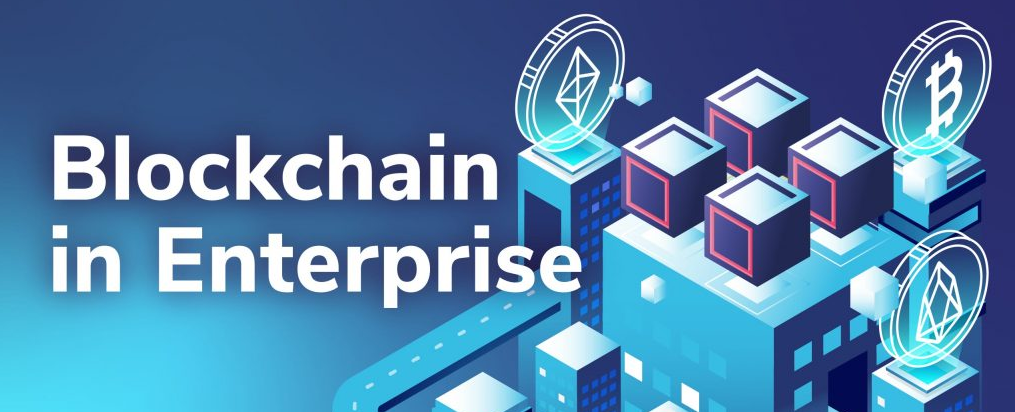
List of Blockchain Solutions for Enterprise
There are many ways to form a list of enterprise blockchain solutions. One is to outline the most general key areas where organizations can begin applying Web3:
- Blockchain and Distributed Ledger Tech – Relying heavily on distributed ledgers/blockchains make the most sense for enterprises needing to track data, store data, detect counterfeits, etc., within their supply chains.
- DAOs (Decentralized Autonomous Organizations) – Enterprises should consider this new decentralized business structure/governance model that allows stakeholders to participate in critical decision-making.
- Web3 Authentication – Web3 features a unified identification layer that enables users to log in with their Web3 identity (public wallet address). Blockchain-based authentication is already a seamless user experience with minimum onboarding friction. As such, it’s something that every business can benefit from.

Implementing Blockchain Solutions
To implement any of the above three areas, your enterprise needs to properly utilize the available “Web3 for enterprise” solutions and tools either directly or via various companies. These mainly come in the following forms:
- Web3 Computing Sector Solutions – They come in the form of shared storage protocols (blockchain as storage), blockchain oracles, IoT protocols, private computing protocols, and shared networks. Some examples include Chainlink (oracle), Filecoin (shared storage), Helium (IoT), IPFS, etc.
- Node Providers – By relying on node-running companies, you can use their services instead of running your own nodes. The most reputable node providers include Alchemy, Infura, Chainstack, QuickNode, RunNode, GetBlock, and Pocket Network.
- Web3 API Providers – Reliable Web3 APIs are arguably the most important tools for dapp development. They enable you to obtain precompiled and precalculated on-chain data. The most reputable Web3 API providers include The Graph, Covalent, QuickNode, Bitquery, Alchemy, Biconomy, and Moralis.
- Projects Focusing on Smart Contracts Development – Programming languages, frameworks, IDEs, Web3 libraries, and other tools needed for building smart contracts. Some leading examples include Solidity, Ganache, Truffle, Hardhat, Remix, OpenZeppelin, and Metaplex.
- Web3 Wallets – Web3 wallets enable you to manage, send, receive, and store cryptocurrencies, complete the Web3 authentication process, confirm on-chain transactions, test dapps, etc. The most popular Web3 wallets include MetaMask, Rainbow, Trust Wallet, Coinbase Wallet, Argent, and Phantom.
- Blockchain Explorers – These dapps enable you to explore on-chain data and even interact with smart contracts on a supported chain. The most popular blockchain explorers include Etherscan for Ethereum, PolygonScan for Polygon, BscScan for BNB Chain, SnowTrace for Avalanche, etc.
Many, if not all, of the above-listed blockchain infrastructure companies are offering good solutions. However, we can only vouch for Moralis.
Enterprise Blockchain Solutions – Ultimate Option
At this point, you already know that Moralis is the ultimate Web3 API provider that enables you to build faster and smarter. We also already mentioned that Moralis is cross-platform interoperable – bridging the development gap between Web2 and Web3. Thanks to the cross-chain interoperability of Moralis, you can target all the leading programmable blockchains (explore supported chains). So, let’s take a closer look at the enterprise blockchain solutions this Web3 provider offers.

The current Moralis fleet of products includes the following:

Web3 Data API
The Moralis Web3 Data API is Web3’s most popular indexed blockchain data provider and one of the essential enterprise blockchain solutions. Via the above-listed API subgroups, this product enables you to fetch parsed data regarding:
- Cross-chain NFT transfers, prices, and metadata
- Real-time token prices, transfer, and ownership data
- Native cryptocurrency and token balances for Web3 wallets
- Detailed transaction and log data
- On-chain events and logs
- Specific blocks and their content
- Liquidity reserves and trading pairs
In addition, thanks to the Resolve API, you can resolve ENS names and unstoppable domains. Plus, you can easily upload and pin your data automatically to the leading decentralized storage solution with the IPFS API. What’s more, you can accomplish all of this by simply using short snippets of code like the ones presented in the intro. To see the Web3 Data API in action, check out our tutorial that shows you how to use a Web3 get block function.

Moralis Streams API
Need an enterprise solution for blockchain allowing you to listen for real-time on-chain events for any smart contract and wallet address on any EVM-compatible chain? Then the Moralis Streams API is a no-brainer. With this next-gen API, you can detect any blockchain event and receive webhook requests in return. Also, with those webhooks, you can trigger all sorts of actions for your dapps or external media. This can serve to create desktop notifications, social media bots, in dapp actions, and much more.
You can create and manage your Web3 streams via the Moralis admin UI or the Moralis SDK. In either case, you have the same options and filters at your disposal, allowing you to make the most out of real-time blockchain data. Our crypto wallet tracking tutorial is a great example of using Moralis Streams to listen to a wallet address.

Authentication API
The Authentication API from Moralis enables your dapp’s users to authenticate and verify signed messages with their Web3 wallets. It is built according to the EIP-4361 standard, supporting off-chain authentication with EVM or Solana-compatible wallets to establish user sessions with your dapp. The Authentication API does so via two out-of-the-box API endpoints: “Request challenge” and “Verify challenge”. The former requests a challenge message for wallet signature, while the latter verifies the signed challenge message. You can get better acquainted with this enterprise blockchain solution by exploring our Supabase authentication tutorial.
Solana API
Since Solana is one of the most popular non-EVM-compatible blockchains, Moralis also offers an impressive API set for this chain. Whether you want to fetch on-chain data for Solana accounts or explore non-fungible or fungible SPL tokens, the Solana API has your back. Our latest Solana Python API neatly showcases all Moralis Solana API endpoints.
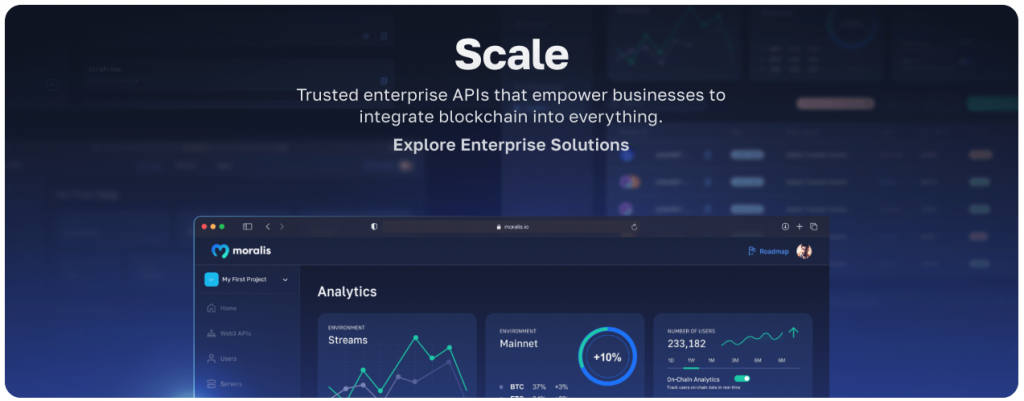
All the above-presented Moralis enterprise blockchain solutions are designed to scale, and your team can start using them with a free Moralis account. However, if you need help or have any special requests regarding bringing blockchain to your business, make sure to click on the “scalable Web3 infrastructure” link in the “Overview” section of this article. Once on the “Scalable Web3 Infrastructure” page, scroll down and fill out our contact form:
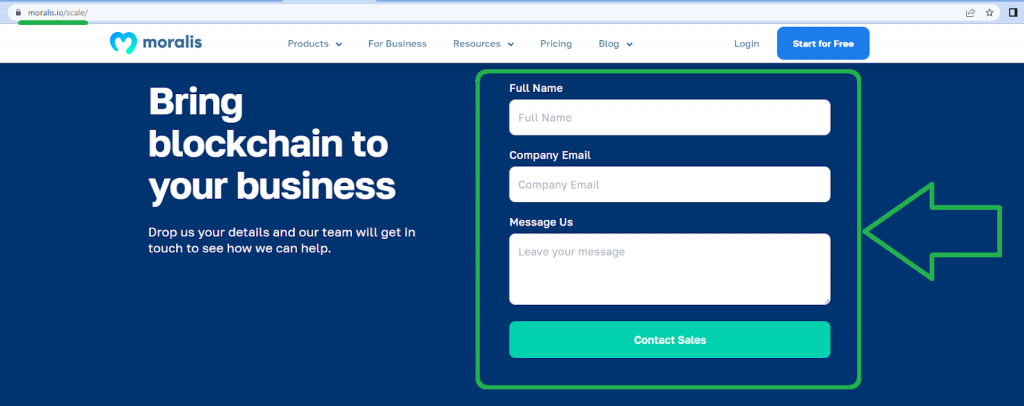
Exploring Enterprise Blockchain Solutions
Aside from the previously-listed enterprise blockchain solutions, it’s also worth exploring CoinDesk’s “Digital Asset Classification Standard” (DACS). This investing-oriented classification standard neatly presents all the current sectors, industry groups, and industries of the blockchain industry. With that in mind, take a few minutes and explore the following graphic representation of DACS:
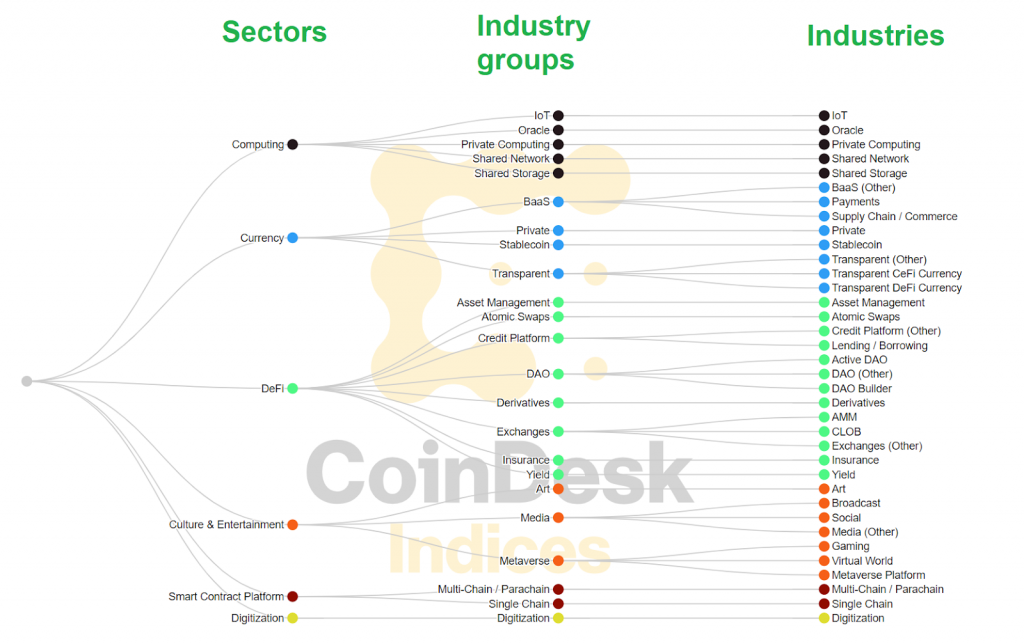
What are Blockchain Solutions and Services?
Blockchain solutions and services are solutions and services that, in some way, incorporate or support the implementation or the use of blockchain technology. They are essential in ensuring that the latest iteration of the web (Web3) goes mainstream sooner rather than later. After exploring the above “List of Blockchain Solutions for Enterprise” section and DACS, you can see that blockchain solutions and services come in various shapes and sizes. Now, to put today’s discussion into a proper perspective, it helps to look at the current blockchain tech stack.
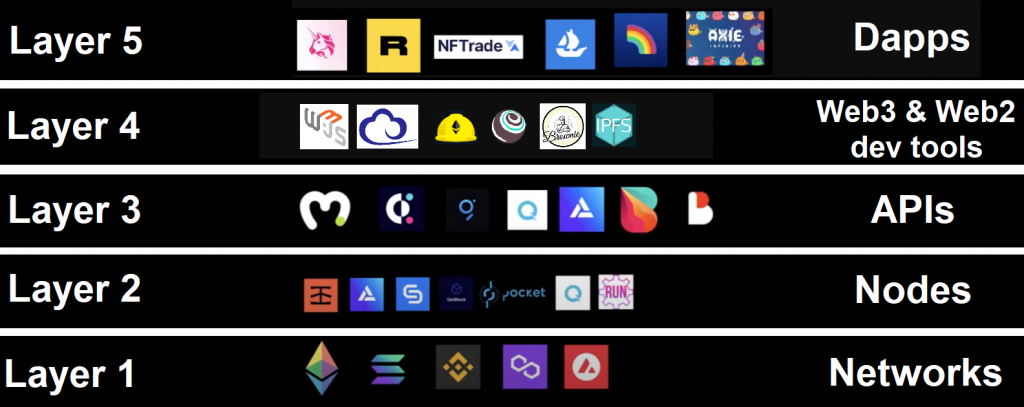
The Blockchain Tech Stack
The above image represents the five layers of the current blockchain tech stack. All these layers significantly contribute to shaping Web3. However, as you can imagine, all the top four layers would not be possible without Web3 networks (layer one). They are the blockchains themselves and represent the foundations of the blockchain infrastructure.
On the other end of the spectrum, you can see decentralized applications (dapps). Dapps are the doors enabling users to interact with blockchains and give all the bottom layers purpose. After all, what’s the point of all the other layers if there’s no user-friendly way to utilize them? So, dapps are the layer that will bring Web3 to the masses.
The middle-three blockchain tech stack layers serve Web3 developers to bridge the gap between blockchain networks and dapps. The outstanding representatives of those layers enable devs to do so without breaking a sweat, using their legacy programming skills. That’s exactly what Moralis does, which makes Moralis the ultimate enterprise blockchain solution.
Exploring Enterprise Blockchain Solutions – Summary
In today’s article, you had a chance to explore the list of enterprise blockchain solutions. We specifically looked more closely at the ultimate Web3 API provider – Moralis. As such, you learned how the Web3 Data API, Moralis Streams API, Authentication API, and Solana API make your Web3 development endeavors much more straightforward. Nonetheless, you also had an opportunity to get familiar with DACS and the current blockchain tech stack.
Whether you are a one-man band or a large team of devs, Moralis will give you the edge over your competitors if you want to make a name for yourself in the Web3 space. Thanks to the speed, reliability, and ease of use of Moralis APIs, you’ll save time and money on your blockchain-related backend development. What’s more, you can start with a free account. In case you need more hands-on assistance from our teams, look over the “Scalable Web3 Infrastructure” page and reach out.
On your way to creating successful dapps, make sure to use the many resources from Moralis. Aside from the documentation, YouTube channel, and blog, you can also rely on our vetted crypto faucet list. The latter includes all the leading testnet faucets, including a reliable Goerli faucet. Also, do not forget to check out Moralis Academy. There, you can embark on a personal Web3 study journey or train your entire team in blockchain development.

Read More: moralis.io

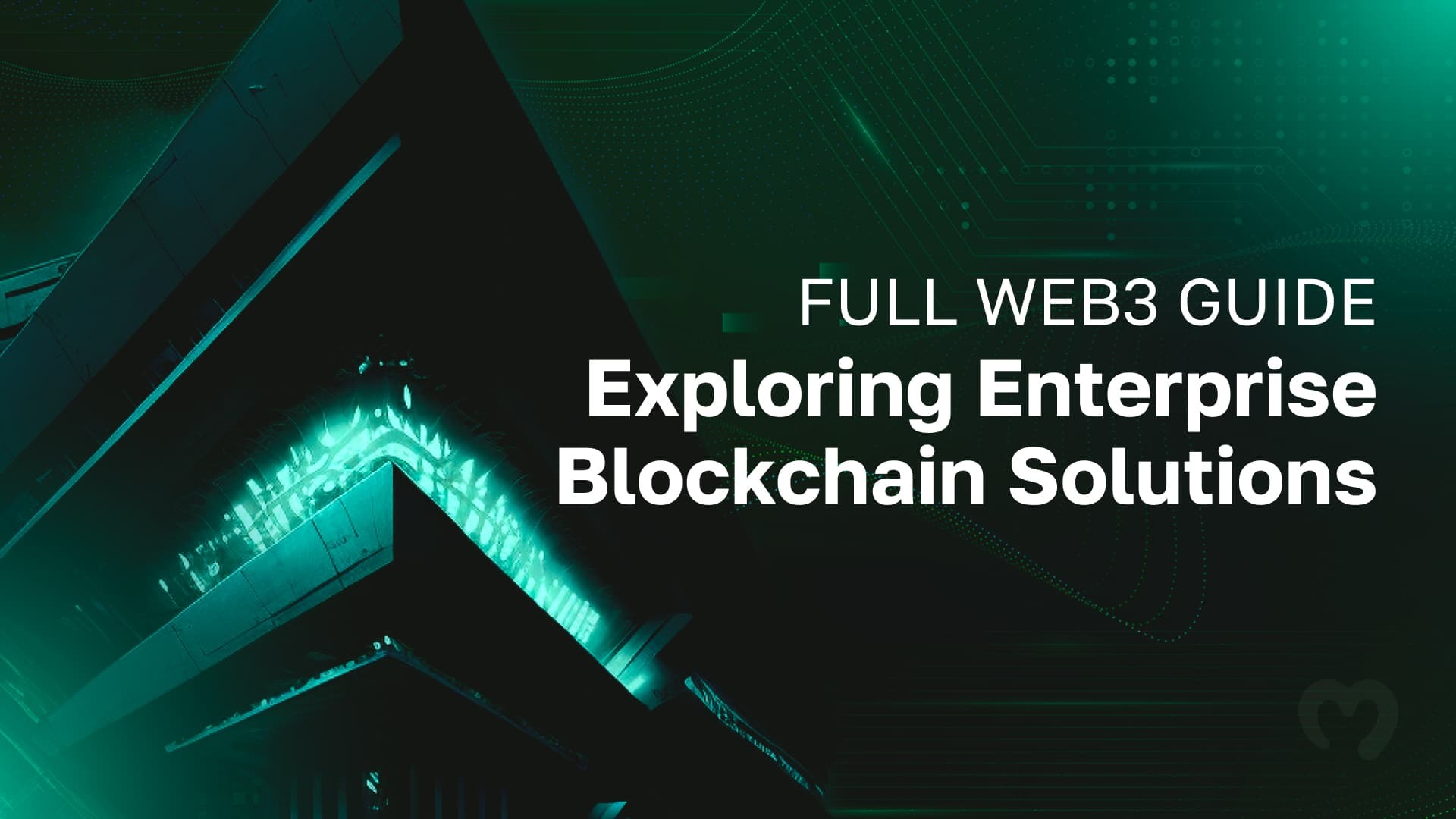


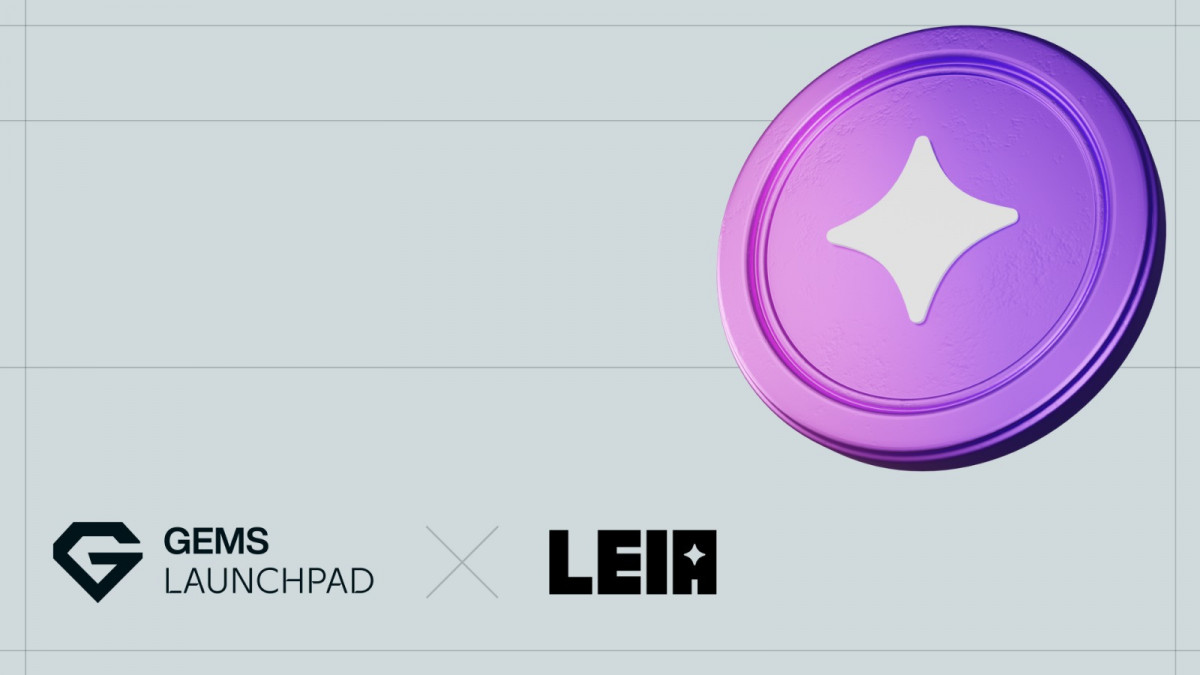
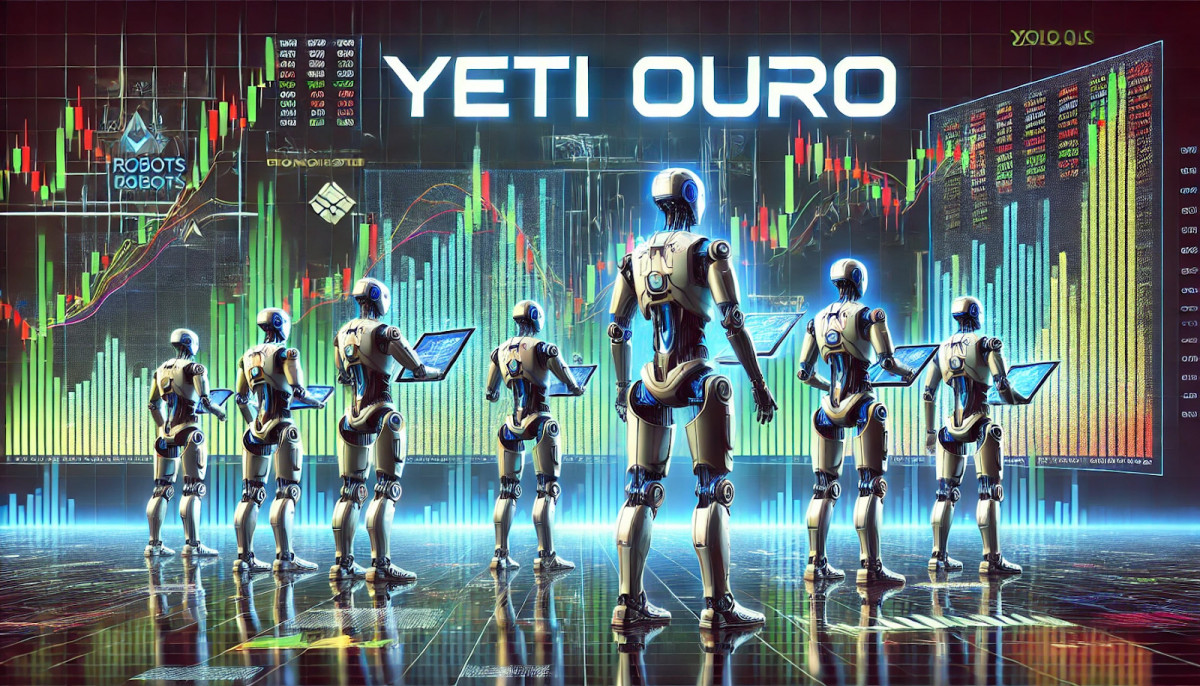



 Bitcoin
Bitcoin  Ethereum
Ethereum  Tether
Tether  XRP
XRP  Solana
Solana  Dogecoin
Dogecoin  USDC
USDC  Cardano
Cardano  Lido Staked Ether
Lido Staked Ether  TRON
TRON  Avalanche
Avalanche  Sui
Sui  Wrapped stETH
Wrapped stETH  Toncoin
Toncoin  Chainlink
Chainlink  Shiba Inu
Shiba Inu  Stellar
Stellar  Wrapped Bitcoin
Wrapped Bitcoin  Hedera
Hedera  Polkadot
Polkadot  WETH
WETH  Bitcoin Cash
Bitcoin Cash  LEO Token
LEO Token  Uniswap
Uniswap  Litecoin
Litecoin  Pepe
Pepe  Hyperliquid
Hyperliquid  Wrapped eETH
Wrapped eETH  NEAR Protocol
NEAR Protocol  Ethena USDe
Ethena USDe  USDS
USDS  Internet Computer
Internet Computer  Aptos
Aptos  Aave
Aave  Mantle
Mantle  Cronos
Cronos  POL (ex-MATIC)
POL (ex-MATIC)  Render
Render  Ethereum Classic
Ethereum Classic  MANTRA
MANTRA  Bittensor
Bittensor  Monero
Monero  Tokenize Xchange
Tokenize Xchange  Artificial Superintelligence Alliance
Artificial Superintelligence Alliance  Dai
Dai  Virtuals Protocol
Virtuals Protocol  Arbitrum
Arbitrum